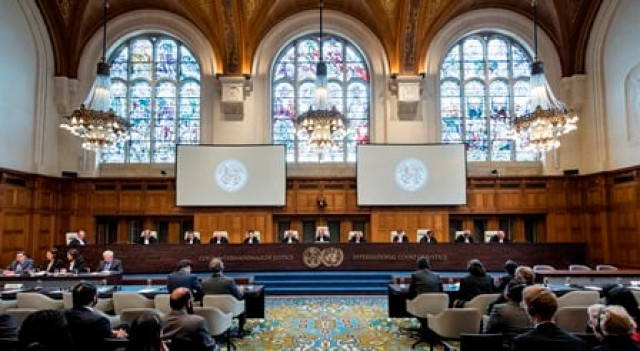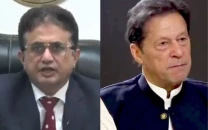ICJ stays Jadhav’s hanging till it makes final ruling
The court has not yet decided whether it has jurisdiction to hear India’s case

Legal Battle: View of the ICJ courtroom during the hearing of the case. PHOTO Courtesy: ICJ
Judges at the International Court of Justice (ICJ) ruled that Jadhav must not be put to death by Islamabad until they have had time to pass final judgement in the case.
Jadhav was arrested in a counter-intelligence raid in Mashkel, Balochistan in March 2016. In a video confession released soon after, he confessed to being assigned by India’s Research and Analysis Wing (RAW) to plan, coordinate and organise espionage and sabotage activities in Balochistan and Karachi with an aim to destabilise and wage war against Pakistan. He was convicted last month by a military court and sentenced to death.
#ICJ PRESS RELEASE: Order in #India v. #Pakistan Case delivered today (provisional measures) https://t.co/fCj0yBhptd pic.twitter.com/SMVd41TrfM
— CIJ_ICJ (@CIJ_ICJ) May 18, 2017
The Court, the statement added, also stated that the Government of Pakistan shall inform it of all measures taken in implementation of the Order.
Pakistan at the ICJ
[fbpost link="https://www.facebook.com/india.reuters/videos/10155066619120630/"]
India denies Jadhav was a RAW agent but admits that he was a retired naval officer. It lodged a case in ICJ earlier this month, accusing Pakistan of violating the Vienna Convention by failing to provide him with consular access, as well as breaking international human rights law. New Delhi also appealed for the court to impose emergency measures to suspend Jadhav's execution until the legal battle in The Hague has concluded.
Pakistan maintained that the ICJ need not intervene as it had adhered to a 2008 bilateral treaty with India that supersedes the Vienna pact by stating that the right to consular access can be waived where ‘national security’ is at risk. Islamabad has also noted that Jadhav's sentence remains subject to appeal and he is no immediate danger of execution. It described India's decision to take its case to the UN court as ‘political theatre’.
The ICJ ruling did not favour the arguments of either side but was meant to prevent Pakistan from taking any irrevocable steps before the court can decide whether it has jurisdiction in the case and, later, which side is right or wrong.
Pakistan, India face off at The Hague
"Pakistan shall take all measures at its disposal to ensure that Mr Jadhav is not executed pending the final decision in these proceedings," said the court's president Ronny Abraham. He also ordered Pakistan to inform the tribunal that it has implemented the decision, and stressed that ICJ decisions are binding on all member states.
Outlining the reasons for its decision, Abraham said Pakistan had ‘given no assurance’ Jadhav would not be executed before the court delivered its final decision. "The mere fact that Mr Jadhav is under a death sentence and might therefore be executed is sufficient to demonstrate the existence of a risk of irreparable prejudice to the rights claimed by India," he added. Therefore the court was ‘satisfied’ of the ‘urgency’ of the case.
"The court has given its ruling on provisional measures, which is basically a procedural process," the Pakistani envoy at the ICJ, Moazzam Ahmad Khan, told reporters. "The court has said nothing on the merits or maintainability of the case."
India’s Foreign Minister Sushma Swaraj welcomed the ruling and said in a tweet that it was "a great relief to the family of Kulbhushan Jadhav and people of India."
"I assure the nation that under the leadership of Prime Minister (Narendra) Modi we will leave no stone unturned to save KulbhushanJadhav," she said in another tweet.
India petitions ICJ for stay in Kulbhushan Jadhav’s death sentence
The tribunal has not yet decided whether it has jurisdiction to hear India's case in full. It will now call for a more comprehensive filing from India before it decides on the matter. A final ruling could take months, if not years.
The ICJ was set up in 1945 to rule on disputes between nations in accordance with international law. The Vienna Convention has been a frequent subject of disputes at the ICJ, often in cases involving the United States. US authorities ignored a similar ICJ injunction in 1999 and executed a German national.
The last time India and Pakistan took a dispute to the ICJ was in 1999 when Islamabad protested the downing of a Pakistani navy plane that killed 16 people. But the tribunal decided it was not competent to rule in the dispute and closed the case. AGENCIES (WITH ADDITIONAL INPUT FROM NEWS DESK)



















COMMENTS
Comments are moderated and generally will be posted if they are on-topic and not abusive.
For more information, please see our Comments FAQ